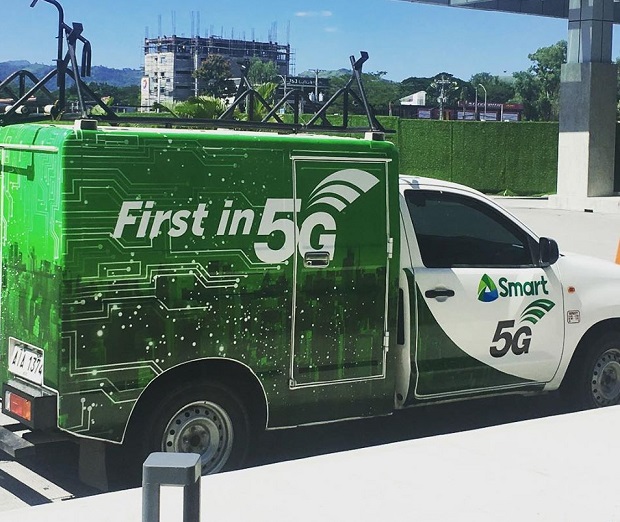PLDT-owned mobile operator Smart Communications has announced that it will activate its commercial 5G service on Thursday, July 30, with the initial phase of deployment in key business districts of Metro Manila.

In a statement, the company said Smart Signature, Infinity and other Smart postpaid subscribers will be able to use its 5G phone network using Smart-certified handsets with 5G-activated SIMs.
The areas where the 5G service will be available include the Makati Central Business District (CBD), Bonifacio Global City CBD, Araneta City, SM Megamall, and Mall of Asia Bay Area. Smart said 5G is also being rolled out in key high-traffic areas such North Avenue in Quezon City and Taft Avenue in Manila, as well as in Ortigas CBD, and Clark Green City in Pampanga.
Through partnerships with device manufacturers, Smart said will also launch its initial lineup of Smart 5G-certified devices from Huawei, Samsung, RealMe and Vivo, which will be available with Smart Signature plans in select Smart Stores.
“After many years of preparation and sustained investments, we’re very happy to say that Smart subscribers can now try out and enjoy the super-fast data service that Smart 5G can deliver,” said Alfredo S. Panlilio, PLDT chief revenue officer and Smart president and CEO.
“The launch of Smart’s 5G service enables the Philippines to level up and join the ranks of countries utilizing the next generation of mobile technology. For our customers, it opens the door to an even higher level of customer experience in terms of enjoying video, playing esports and using more powerful digital services,” Panlilio said.
“As we rollout 5G in more areas of the country, this will complement the deployment of our 4G/LTE network which is already the fastest and most extensive in the country. To date, Smart 4G/LTE and 3G coverage serves 95% of the country’s population,” he added.
The first five Smart 5G-certified devices are now available with the Smart Signature Device Plans S, M, L, and XL.
“On top of giving customers priority when it comes to the latest in technology and devices, Smart Signature also enables subscribers to do more by providing more data allocation of up to 30 GB per month. The plans also come with Unlimited OnNet Calls, Unlimited AnyNet Texts, and allocations for AnyNet Calls plus exclusive perks and rewards,” said Jane J. Basas, Smart senior vice president and head of consumer wireless business.
Customers can sign up for a Smart Signature Plan at Smart Stores nationwide or via the Smart Online Store. Subscribers can also experience Smart 5G first-hand with the 5G-ready handsets featured at select Smart Stores in Metro Manila, including Smart Tower in Makati City, Gateway Mall, SM Mall of Asia, SM Megamall, and The World Plaza in Bonifacio Global City, Taguig.
The strategy to deploy 5G has been embedded in Smart’s network planning over the past five years, the company said, adding that it started conducting tests with 5G in 2016. In 2018, it fired up the country’s first 5G base stations in Makati with Huawei and the Clark Freeport Zone in Pampanga with Ericsson. Last year, Smart also launched the first Smart 5G Lifestyle hub and 5G-enabled shopping mall in Araneta City, as well as the first Smart 5G campus at the Ateneo de Manila University.
For its 5G investment, PLDT and Smart poured nearly P260 billion in overall capital expenditure (capex) spend over the past five years. In 2019 alone, the PLDT Group’s capex reached a record P72.9 billion. For 2020, the telco said capex is expected to reach P70 billion despite the slowdown in network rollout due to the quarantine controls imposed in the second quarter of this year.
PLDT also has partnered with Cisco and Huawei, to transform its IP fiber transport infrastructure into a fully automated, software-defined 5G-ready network. The infrastructure will enable PLDT to deliver next generation digital services like Artificial Intelligence and the Internet of Things via 5G.
Smart has been able to fast-track the nationwide roll out of its 4G/LTE service that when combined with its 3G service now provides mobile Internet service to over 93% of the country’s cities and municipalities and 95% of the population.
“It has taken a lot of time and effort. But the future is now here,” Basas said.




